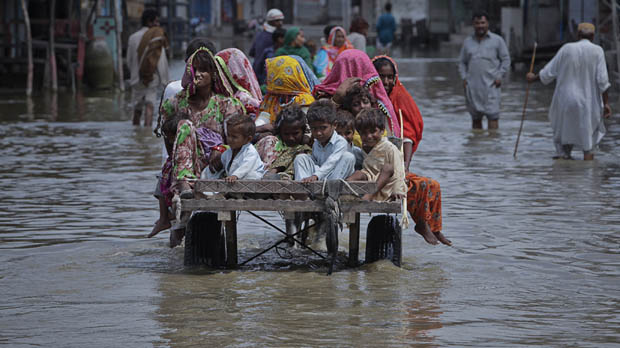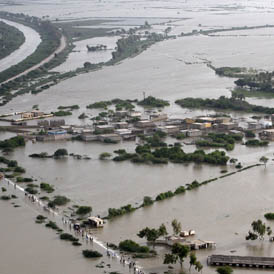Pakistan facing ‘unimaginable catastrophe’
A group of international aid agencies is warning that relief efforts in flood-hit Pakistan, where millions of people have been affected, are under threat because of a lack of funds.

Oxfam, Save the Children, Care and ACTED are urgently calling for more money from governments and donors to continue their relief efforts, which are focused on combating malnutrition and disease.
“Over two months into the crisis millions of people are still without basics. If relief operations stop, it could lead to an unimaginable catastrophe,” Oxfam’s Pakistan director Neva Khan said.
“With winter approaching fast, millions of people who are still without shelter will be left out in the cold. We urgently need to see the same donor generosity and giving that took place last year during the floods,” she continued.
Millions in need
Record-breaking monsoon rain in August has affected over five million people in the hardest hit southern province of Sindh, where significant damage has been reported in 22 of the province’s 23 districts.
A further 4 million have been affected in southern Balochistan, eastern Punjab, and parts of Kashmir.
Across the country, 3 million people are in urgent need of emergency food assistance, and nearly a million refugees are still without shelter.
With winter fast approaching, aid agencies are warning that diseases are on the rise and that 2 million adults and 3 million children are at severe risk of outbreaks of malaria, dengue fever, malaria and acute respiratory infection.
Read more: Praying for mercy from the floods one year on
Sindh hardest hit
The disaster comes after the 2010 floods, the worst in Pakistan’s history, from which thousands of people are still recovering. But while most regions were spared by the 2011 floods, Sindh was not.
In Sindh, flood waters have devastated homes, businesses and livestock, destroying livelihoods and undermining food security.
At least 2.2m acres of cropland have been inundated, with nearly 75 per cent of crops in 16 districts either destroyed or damaged and 36 per cent of livestock lost or sold

Funding crisis
If it does not find extra funds, Oxfam says it will be forced to cut back on its efforts after December, meaning 3.9 million people it had planned to reach would go without help.
Save the Children says it has raised only a third of the money it planned to raise, and Care has only raised reached 10 per cent of the money it needs to help 150,000 people in need of emergency healthcare.
The UN’s $357m appeal has only received about a quarter of the money it needs.
Who is contributing most to the UN's appeal?
- The US is by far the greatest contributing nation to the UN's appeal having given $13.4m – that is 3.8 per cent of what is required
- The world's third richest country, Japan, has given 2.5 percent of what is needed
- Germany, the world's fifth richest, has given 2 per cent
- UK, the seventh richest country, has given 1.8 per cent
- The European Commission has given $20.6m, 5.8 per cent of the appeal
“If more funding is not received, relief supplies will run out within weeks, which impacts UN agencies from providing life-saving clean water, sanitation, food, shelter and healthcare,” said UN Spokesperson Stacey Winston.
The government of Pakistan also faces a funding crisis, aggravated by the damage in the agriculturally and industrially important Sindh province.
According to the Ministry of Finance, Pakistan’s economy is estimated to have suffered a 0.5 per cent loss in growth, bringing GDP down to 4.2 per cent, because of the floods.
